
Friday, December 29, 2006
Tuesday, December 19, 2006
YOU are the Time Person of the Year.
 You and me, the nameless entities who straddle between the real and the virtual worlds, trawling the depths of the Internet and those of us living by it have just been awarded the TIME magazine ‘Person of the Year Award’. We have now joined the haloed portal along with the likes of Charles Lindbergh, Mahatma Gandhi, Queen Elizabeth II, Charles De Gaulle, Mikhail Sergeyevich Gorbachev, Nelson Mandela…. TIME’s salutation to You and me couldn’t have happened earlier; haven’t we bared our souls to this gigantic wired and wireless mass, dropped our fears and trepidations and danced our fingers on the keyboard to write and express our opinions, share joys and sorrows, rantings and ravings, picked up that video cam, shot and uploaded out work on You Tube and the like. We have made the Internet what it is and have got so much much more in return than we have given.
You and me, the nameless entities who straddle between the real and the virtual worlds, trawling the depths of the Internet and those of us living by it have just been awarded the TIME magazine ‘Person of the Year Award’. We have now joined the haloed portal along with the likes of Charles Lindbergh, Mahatma Gandhi, Queen Elizabeth II, Charles De Gaulle, Mikhail Sergeyevich Gorbachev, Nelson Mandela…. TIME’s salutation to You and me couldn’t have happened earlier; haven’t we bared our souls to this gigantic wired and wireless mass, dropped our fears and trepidations and danced our fingers on the keyboard to write and express our opinions, share joys and sorrows, rantings and ravings, picked up that video cam, shot and uploaded out work on You Tube and the like. We have made the Internet what it is and have got so much much more in return than we have given.Image courtesy TIME magazine.
Monday, December 18, 2006
Launching my Book Reviews Blog
 Just launched my Book Reviews Blog (on blogger!). This blog had been in my mind for a long long time and finally it has seen the light of day. The sidebar has the link to the site and will open in a new window. I hope I am able to keep the momentum going on this and that's my biggest concern. Hope you guys enjoy reading!
Just launched my Book Reviews Blog (on blogger!). This blog had been in my mind for a long long time and finally it has seen the light of day. The sidebar has the link to the site and will open in a new window. I hope I am able to keep the momentum going on this and that's my biggest concern. Hope you guys enjoy reading!Thursday, December 14, 2006
Strike(ing) Politics…
The issues on which strike calls are given is, at the best of times, blurred and fuzzy with grassroot cadres hardly able to articulate the reasons while they merrily go about enforcing the shutdown. India’s unorganized sector - constituting almost 90% of the working/business segment is among the worst hit and the communists, messiahs (sic) of social change and equality, don’t even figure on their radars daily wagers (of all hues) for whom every single day is a challenge to put bread on the table. Politics and politicians the world over, with maybe some stray exceptions, does not serve people’s interests! Their trip in life lies somewhere else – all the trappings of power and money! We sadly do not figure in that trip.
There is a silver lining though – some people standup and face off with the scrum. Today (12/14/06) is possibly the first time during a strike call, by militant trade unions in West Bengal, that the Chief Minister (the highest political authority in the state) has chosen to deploy a strong police force and armed escorts to vehicles ferrying people willing to work!
Wednesday, November 15, 2006
Unashamed Love – Pure and Simple!
 It's never too late to admit your love affairs or is it? I am in love will all things Google.
It's never too late to admit your love affairs or is it? I am in love will all things Google.  My work day starts with google and ends (in most cases) with google. For me its Google Google all the way!
My work day starts with google and ends (in most cases) with google. For me its Google Google all the way! The guys out there are doing a fantastic job and kudos to them!
The guys out there are doing a fantastic job and kudos to them!
Friday, November 10, 2006
Debating the dealth penalty
Hamlet (III, i, 56)
Death penalty – as the ultimate punishment, has been a raging debate in this country, fueled by the recent death penalty awards for two heinous crimes – attacking the ‘heart’ of Indian democracy and the brutal assault and murder of Priyadarshini Mattoo. Were the judges right is awarding the death sentence? Can’t comment on that, but then the judges handed down the stiffest sentences in the rulebooks and justifiably so!
The larger question here is – “Is the death penalty the only form of the strictest deterrent and punishment for the rarest of rare crimes?” To my mind no!, not because I believe in mush such as “if you can’t create life, you can’t take it” or “only God has the right to take life” etc etc but then the criminals, the lowest form of vermin, get away with so much less minus all terrible moments that their victims had to endure.
We got to change the rulebooks! The severest punishment for these vermin’s would be to throw them into solitary confinement. A cell with no natural light, no access to human faces, doesn’t get to hear human voices or any natural noises – only eerie silence, no TV, no radio, no newspaper, no magazines, no books, no nothing! Let them sit absolutely alone, and I really mean absolutely alone, and contemplate their deeds and their lives. Let them forget how the world looks! Take them out for 10 minutes on a varying frequency – once in 6 months, once in 8 months, once in a year or two! Nothing that the guy can look forward to.
To live and live like this! God!, the guy would barter it for death penalty any day! Then you know that they have faced their nemesis. Record what these guys have to say after 3 years of confinement and play that as the deterrent.
I guess its time we change the rulebooks!
"To-morrow, and to-morrow, and to-morrow,
Creeps in this petty pace from day to day,
To the last syllable of recorded time;"
Macbeth (V, v, 19)
Monday, November 06, 2006
Celebrating Diwali

Picture 1: Rocket ignited and ready to take off.

Picture 2: Rocket takes off leaving behind a fire trail.
Picture 3: Flower Pot...
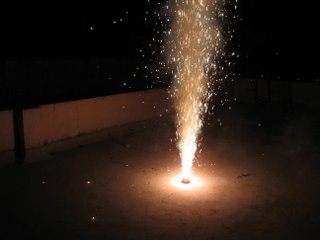
Picture 4: Flower Pot ...

Picture 5: Spinner
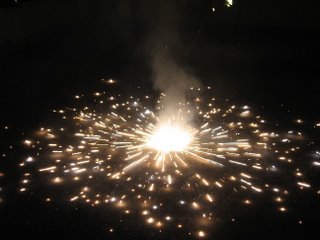
Wednesday, November 01, 2006
The swagger of the powerful
To me the rot starts at the very top. J. P. Singh, Sanjay’s father is as much to blame, if not more, for the assault and murder of Priyadarshini Mattoo. From the so called educated gentry and an IPS (Indian Police Service, for those who don’t know) officer to boot Mr. Singh should have instilled the right values in his progeny but then he himself was arrogant, abusive and reveled in his own power. One should have seen Sanjay’s younger brother’s expression while threatening jurnos, covering the story, to believe the deep- seated arrogance and power syndrome of the Singh’s. Senior Singh broke every rule in the book and twisted all the government machinery handles to protect his murderer son – the most sickening of all things.
Sanjay’s one act, planned and premeditated, have in turn impacted so many lives that it is not funny. Priyadarshini’s parents were devastated, the most horrible kind of an experience for a parent to undergo but then that’s not all. Sanjay got married and had a child. I keep thinking of his wife and how an innocent life has to go through such a harrowing time for no fault of her’s and what to say of the child! The kid has been scarred for life. The man and his family were arrogant enough to devastate another set of family.
The death sentence, to my mind, is the easy way out for Sanjay. If I had my way I would have given him a no-parole solitary life sentence with no access to any humans, books and mags, visitation rights …..nothing! Sit alone and contemplate all your life. Reflect father and son and all you critters of the most horrible kind.
Saturday, October 14, 2006
Nobel Peace Laureate Dr. Mohammad Yunus
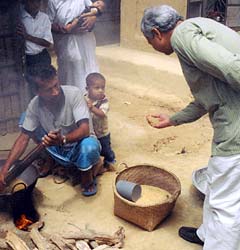 This year’s Nobel Peace Laureate Dr. Mohammad Yunus of Bangladesh is among the best possible recipients of the Nobel laurel. Pioneer of the micro credit financing scheme, he has played a role no less than possibly Mother Teresa’s in the lives of his countrymen and countless others around the world where the micro credit system has been put to practice.
This year’s Nobel Peace Laureate Dr. Mohammad Yunus of Bangladesh is among the best possible recipients of the Nobel laurel. Pioneer of the micro credit financing scheme, he has played a role no less than possibly Mother Teresa’s in the lives of his countrymen and countless others around the world where the micro credit system has been put to practice. economics, global warming, North Korea going nuclear and generally making a basket case of this world, 10% spend their lives waging war a.k.a. M/s Bush, Bin Laden etc. The balance 5% is what makes the world tick. It takes the likes of Dr Yunus to really go into the heart of pressing human problems and evolve truly unique solutions. Economic inequality, lack of access to education and religious narrow mindedness are the most potent causes of friction in society today. Dr. Yunus’s greatest contribution has been to craft uncluttered and practical 'on-the-ground' solutions, to help people escape the drudgery of poverty, based on the basic human principles of trust, honesty, and willingness to work hard.
economics, global warming, North Korea going nuclear and generally making a basket case of this world, 10% spend their lives waging war a.k.a. M/s Bush, Bin Laden etc. The balance 5% is what makes the world tick. It takes the likes of Dr Yunus to really go into the heart of pressing human problems and evolve truly unique solutions. Economic inequality, lack of access to education and religious narrow mindedness are the most potent causes of friction in society today. Dr. Yunus’s greatest contribution has been to craft uncluttered and practical 'on-the-ground' solutions, to help people escape the drudgery of poverty, based on the basic human principles of trust, honesty, and willingness to work hard.The fact that women are the biggest beneficiaries of his schemes will ensure that generations to come will reap the benefit of his poverty eradication mission.
Congratulations Dr. Yunus!
Wednesday, October 04, 2006
My Ma's 3rd Anniversary
 It was on this day (according to the Hindu Calender), three years ago that I lost my Ma. It was so sudden that it was, as if, I was hit by a sledgehammer. I can still recall the day. I was in office when I got a call from Baba that Ma had to be hospitalised. I could think of nothing but on how to get on the next flight to Calcutta. I don't recall how I managed to get a ticket but I was travelling alone. When I reached home and started packing up I get a call from my brother telling me 'Ma is no more'. I just froze up! not a single drop of tear. I remember going to the Corporation Bank ATM to withdraw cash for a second air ticket for my wife. Flew into Calcutta, that was in the midst of a heavydown pour. As I write the images come up vividly in my mind's eye - my brother and Minku (brothers friend) were waiting outside the terminal. We just couldn't speak. Drove down towards home, brought cigarettes on the way (a 20's pack I remember). The downpour had been so heavy that we were water logged right upto our front gate. There was Ma, in the small front verandah, lying on the cot - as if sleeping. Someone had smeared sindur on her forehead. I just
It was on this day (according to the Hindu Calender), three years ago that I lost my Ma. It was so sudden that it was, as if, I was hit by a sledgehammer. I can still recall the day. I was in office when I got a call from Baba that Ma had to be hospitalised. I could think of nothing but on how to get on the next flight to Calcutta. I don't recall how I managed to get a ticket but I was travelling alone. When I reached home and started packing up I get a call from my brother telling me 'Ma is no more'. I just froze up! not a single drop of tear. I remember going to the Corporation Bank ATM to withdraw cash for a second air ticket for my wife. Flew into Calcutta, that was in the midst of a heavydown pour. As I write the images come up vividly in my mind's eye - my brother and Minku (brothers friend) were waiting outside the terminal. We just couldn't speak. Drove down towards home, brought cigarettes on the way (a 20's pack I remember). The downpour had been so heavy that we were water logged right upto our front gate. There was Ma, in the small front verandah, lying on the cot - as if sleeping. Someone had smeared sindur on her forehead. I just stared! My Pishimoni was there and I remember seeing my wife breakdown. I remember touching Ma, patting her hands, which I loved doing when she was alive.
stared! My Pishimoni was there and I remember seeing my wife breakdown. I remember touching Ma, patting her hands, which I loved doing when she was alive.Everything was in an automode for me. Took Ma to the crematorium atop a truck which we had to cover with a tarpulin due to the steady drizzle that was on. Remember laying down Ma, who had by now been transferred on a makeshift bamboo ladder (for the sake of a better expression), on the cold hard floor of the crematorium. I just can't explain what I went through when I saw this! The endless Q dosen't even spare the dead. Smoked I don't know how many cigarettes before her turn came. I saw the body for the last time being pushed into the electric chamber, and darkness for those left behind.
I remember Ma every single day of my life, more so when I pray before going to sleep. I still carry out the one act that she told me to to do before I go to sleep - write a virtual 'Ma' on the pillow using your fingers. You shall forever banish nightmares!
Also read my brothers remembrance of Ma in his blog. Click on the link below (Opens in a new window):
I Love My Mom
Tuesday, October 03, 2006
Ma was here
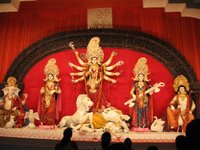 We long for a year for the Durga Puga’s to come and how time flies when Ma is here. The five days of festivities are over and we are
We long for a year for the Durga Puga’s to come and how time flies when Ma is here. The five days of festivities are over and we are 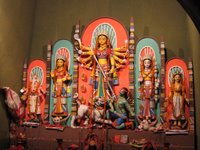 back to our normal routine. What starts out with the ‘Mahalaya’ when we usher in the Goddess to the accompaniment of devotional songs and Vedic Stotra chanting, culminates on Dashmi (the 10th day) when Durga returns to her husband’s place and we symbolically immerse the her idol as a farewell.
back to our normal routine. What starts out with the ‘Mahalaya’ when we usher in the Goddess to the accompaniment of devotional songs and Vedic Stotra chanting, culminates on Dashmi (the 10th day) when Durga returns to her husband’s place and we symbolically immerse the her idol as a farewell.Our inseparable link with spirituality and God is best amplified during
 this season. Durga is welcomed home (earth being her fathers abode) as one welcomes one daughter and worshipped. A huge community
this season. Durga is welcomed home (earth being her fathers abode) as one welcomes one daughter and worshipped. A huge community  expression of the human spirit. We are creative and bold and spendevent we get to bond not only with the God within ourselves but humanity. As an expression of joy or more appropriately ‘Ananda’ and a celebration of human life we spend time feasting, donning new clothes and giving myriad channels to our creativity. There is no place like Kolkata (Calcutta) to see this months planning for and executing the pujas. The saddest part is
expression of the human spirit. We are creative and bold and spendevent we get to bond not only with the God within ourselves but humanity. As an expression of joy or more appropriately ‘Ananda’ and a celebration of human life we spend time feasting, donning new clothes and giving myriad channels to our creativity. There is no place like Kolkata (Calcutta) to see this months planning for and executing the pujas. The saddest part is letting go. For 4 days when we have Ma in our midst we don’t keep a track of time but Dashmi soon looms large. We bid farewell to Ma as we would our loved ones and one has to feel the sadness to believe it.
letting go. For 4 days when we have Ma in our midst we don’t keep a track of time but Dashmi soon looms large. We bid farewell to Ma as we would our loved ones and one has to feel the sadness to believe it.Music forms an integral part of the celebrations and to my mind that is the best form of offering prayers – the channel that helps you to
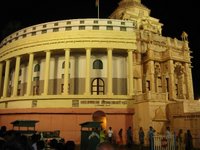 link up to God. Though ‘baithaks’ or musical congregations are drying up at the pandal level the television is proving to be a great platform. This time was no different and really enjoyed some of the shows that were on telly. The channels that should find special mention are ’24 Ghonta’ and ‘e-TV’. Both of these are regional Bengali satellite channels.
link up to God. Though ‘baithaks’ or musical congregations are drying up at the pandal level the television is proving to be a great platform. This time was no different and really enjoyed some of the shows that were on telly. The channels that should find special mention are ’24 Ghonta’ and ‘e-TV’. Both of these are regional Bengali satellite channels.The images that you see in this post are from this year’s (2006) pujas. Hope you enjoy the stunning range of creativity.
Images courtsey - Debopriyo Kar
Wednesday, September 27, 2006
Ma is here
 Bengal's biggest festival, Durga Puja (worshipping of Goddess Durga), has kicked off from today. Goddess Durga, our mother, is here. As a manifestation of 'Shakti' she embodies the victory of good over evil.
Bengal's biggest festival, Durga Puja (worshipping of Goddess Durga), has kicked off from today. Goddess Durga, our mother, is here. As a manifestation of 'Shakti' she embodies the victory of good over evil.Every festival that we Hindus celebrate has legends and stories woven around them and here Ma travels to earth, after defeating the demon - Mahishasura or Mahish the demon (asura). She is visiting her parents and is accompanied by her four children. The celebrations are spread across six days ('Panchami', 'Sasthi', 'Saptomi', 'Asthami', 'Nobomi' and 'Doshomi') and no Bengali, irrespective of where he stays, can't but feel the religious fervor in the air.
 The festivities hide a deeper message where, the actual act of worshipping the Goddess is designed as a huge assimilation exercise. The puja rituals uses different kinds of plants, each with some therapeutic value, water from the sea and the holiest of holy rivers, the various natural foods that we eat and accompanied by music – the soul’s own language. (The Puja’s has its own distinctive drum style). The assimilation attempt, not only brings together all the elements but people of all castes together. It would also be important to note that the demon finds a place along with the Goddess, in the sanctum sanctorum. It goes to illustrate that, while ‘evil’ may not far from the ‘good’, it (evil) need not be despised but instead understood, won over and forgiven.
The festivities hide a deeper message where, the actual act of worshipping the Goddess is designed as a huge assimilation exercise. The puja rituals uses different kinds of plants, each with some therapeutic value, water from the sea and the holiest of holy rivers, the various natural foods that we eat and accompanied by music – the soul’s own language. (The Puja’s has its own distinctive drum style). The assimilation attempt, not only brings together all the elements but people of all castes together. It would also be important to note that the demon finds a place along with the Goddess, in the sanctum sanctorum. It goes to illustrate that, while ‘evil’ may not far from the ‘good’, it (evil) need not be despised but instead understood, won over and forgiven.While we all get lost in the festivities – feasting, pandal hopping, staring at jaw dropping pandal designs, lighting arrangements etc we also need to go back to the original message – that God resides in all of us and we need to reconnect the wires that connect us to Him. In this fast paced world the Durga Pujas gives us that window of opportunity to move towards Spirituality – our ultimate goal and destiny and on a more mundane plane reflect on how we can recognize, understand and win over all negative emotions.
While I write all this, I wish I could reconnect and reflect. It’s so easy to get lost in the milieu.
Friday, September 15, 2006
The ‘Chandipur’ Travelogue – II
 Lingaeswar or keep that for
Lingaeswar or keep that for Day 4. This time around saw me more prepared for the waves both in what I wore and how to keep my head over water, and I literally mean that! Needless to say we all had a whale of time splashing around in the sea for hours on end.
Day 4. This time around saw me more prepared for the waves both in what I wore and how to keep my head over water, and I literally mean that! Needless to say we all had a whale of time splashing around in the sea for hours on end.The afternoon was spent hunting for seashells. We collected a handful of nice shells while Jishnu’s wife (Rupa) displayed a real knack for
 hunting out great pieces of driftwood in stunning shapes. Evenings of Day 2 and Day 3 were spent drinking rum, gorging on fish and chicken snacks and playing tambola. Chandipur, by any standards is a sleepy, offbeat town and there is precious little that you can do to kill time in the evening. This time around (evening of Day 2) we decided to try out an eating joint outside our hotel. The hotel displayed a long strip of signage announcing its fare with almost everything spelt horribly wrong. It was hilarious and I really rue the fact that I did not take a snap of that board. The food though did not reflect the owner’s English
hunting out great pieces of driftwood in stunning shapes. Evenings of Day 2 and Day 3 were spent drinking rum, gorging on fish and chicken snacks and playing tambola. Chandipur, by any standards is a sleepy, offbeat town and there is precious little that you can do to kill time in the evening. This time around (evening of Day 2) we decided to try out an eating joint outside our hotel. The hotel displayed a long strip of signage announcing its fare with almost everything spelt horribly wrong. It was hilarious and I really rue the fact that I did not take a snap of that board. The food though did not reflect the owner’s English  spelling ability and our taste buds were not disappointed with the outcome!
spelling ability and our taste buds were not disappointed with the outcome!Day 4 was reserved for going around to the Nilgiris, then to Panch Lingaeswar and finally land up
 direct to the train station. Panch means five and Lingaeswar stands for the Shiv Linga. As we later learnt it was no temple but five naturally formed Shiv Linga’s, to be reached under a waterfall. We had hired a Tata Sumo (a ATV Cab) the previous evening and the driver dutifully reported at the hotel, sharp at 10:30 or so.
direct to the train station. Panch means five and Lingaeswar stands for the Shiv Linga. As we later learnt it was no temple but five naturally formed Shiv Linga’s, to be reached under a waterfall. We had hired a Tata Sumo (a ATV Cab) the previous evening and the driver dutifully reported at the hotel, sharp at 10:30 or so.  Loaded our entire luggage and were off. The first stop was at an estuary that connected to the sea. The other bank of the estuary was the forest (sic) where Bagha Jatin (a freedom fighter) had shot a British Officer. Also saw loads of fishing trawlers and the all pervading shrimp/prawn farms.
Loaded our entire luggage and were off. The first stop was at an estuary that connected to the sea. The other bank of the estuary was the forest (sic) where Bagha Jatin (a freedom fighter) had shot a British Officer. Also saw loads of fishing trawlers and the all pervading shrimp/prawn farms.The road to Panch Lingaeswar is a nightmare and more like short patches of road amidst a long long stretches of, sometimes crater like, potholes. I have never had such a bone-jarring journey ever and it was a pleasure to get off and stretch my femurs (sic). I must admit though
 that the view made up hugely for all the rattle that we had to endure. Vehicles disgorge their passengers some considerable distance from the Panch Lingaeswar site and you got to walk a good distance to reach the site. Interestingly a dog – we had named him ‘Dharamraj’ after the dog that had followed Yudhisthir, the eldest of the Pandavas, to heaven – escorted us all the way to the temple site and back. Panch Lingaeswar, to me atleast, was a disappointment since I had expected a temple to be there!
that the view made up hugely for all the rattle that we had to endure. Vehicles disgorge their passengers some considerable distance from the Panch Lingaeswar site and you got to walk a good distance to reach the site. Interestingly a dog – we had named him ‘Dharamraj’ after the dog that had followed Yudhisthir, the eldest of the Pandavas, to heaven – escorted us all the way to the temple site and back. Panch Lingaeswar, to me atleast, was a disappointment since I had expected a temple to be there! The journey back to Kolkata was an enjoyable challenge. We had waitlisted tickets on us and these did not get confirmed. We pushed and shoved our way into a general (non reserved) bogey. Had to beg, borrow and almost snidely steal seats for the ladies and children. Ended up standing all the way to Kharagpur before we landed up with (wew!) seats.
The journey back to Kolkata was an enjoyable challenge. We had waitlisted tickets on us and these did not get confirmed. We pushed and shoved our way into a general (non reserved) bogey. Had to beg, borrow and almost snidely steal seats for the ladies and children. Ended up standing all the way to Kharagpur before we landed up with (wew!) seats.Enjoy the pics!
Thursday, August 31, 2006
The ‘Chandipur’ Travelogue
 This post and maybe the subsequent post would be about my quick getaway to Chandipur, made famous by ISRO (our interim missile test range is there). This holiday came after almost 3 years and was a welcome break from the maddening work schedule. This was also the first time my wife and me got to travel with my office colleagues, since we had relocated to Kolkata. We were four families in all, Jishnu, his wife and two kids, Sumanto and Basetti along with their wives and daughters. We were 12 members in all and that, in my reckoning, is not a bad party size!
This post and maybe the subsequent post would be about my quick getaway to Chandipur, made famous by ISRO (our interim missile test range is there). This holiday came after almost 3 years and was a welcome break from the maddening work schedule. This was also the first time my wife and me got to travel with my office colleagues, since we had relocated to Kolkata. We were four families in all, Jishnu, his wife and two kids, Sumanto and Basetti along with their wives and daughters. We were 12 members in all and that, in my reckoning, is not a bad party size!  We left Kolkata (Howrah) early in the morning of 12 August by the Falaknama Express. We were enroute to Balasore, a small sleepy town in Orissa, from where Chandipur is a 30-minute drive. We had already booked our hotel accommodations before leaving Kolkata and saved ourselves the pain of hunting for suitable staying places! It was drizzling when we alighted at Balasore and with Jishnu not keeping well we had to pay the coolies literally through our noses to cart all the luggage that got shipped along with us. Jishnu took the cake when it came to luggage. He had managed to cart one large suitcase, two big side bags and two small bags. Basetti bagged the leanest traveler award with only one suitcase. The steady drizzle did not help matters since we had to haggle with the taxi drivers for a solid 20 minutes before we could arrive at the most ‘amicable’ price to drive us down to Chandipur.
We left Kolkata (Howrah) early in the morning of 12 August by the Falaknama Express. We were enroute to Balasore, a small sleepy town in Orissa, from where Chandipur is a 30-minute drive. We had already booked our hotel accommodations before leaving Kolkata and saved ourselves the pain of hunting for suitable staying places! It was drizzling when we alighted at Balasore and with Jishnu not keeping well we had to pay the coolies literally through our noses to cart all the luggage that got shipped along with us. Jishnu took the cake when it came to luggage. He had managed to cart one large suitcase, two big side bags and two small bags. Basetti bagged the leanest traveler award with only one suitcase. The steady drizzle did not help matters since we had to haggle with the taxi drivers for a solid 20 minutes before we could arrive at the most ‘amicable’ price to drive us down to Chandipur.
The road connecting Balasore and Chandipur is fairly good, thanks to ISRO, and scenic. Feasted my eyes on the earthly rural view of farmers busy planting the ‘ravi’ crop. By the way saw a number of shrimp farms, for the first time in my life. Checking into the hotel was a breeze and in no time we were in our rooms sipping good hot tea. A quick shower and lunch (totally veg, since Sumanto had this weird idea that after so much of traveling we couldn’t stomach non-veg stuff) later we all plonked for a leisurely siesta. It had got somewhat dark by the time we got up. We decided to take it easy in the evening and walk up to the beach and hear the waves. Imagine our shock when we landed there and found that the sea was nowhere to be found and the vast expanse of the beach staring at us. We were terribly dejected, specially my wife since this was her maiden visit to a beach front. We decided to return in the morning.
farmers busy planting the ‘ravi’ crop. By the way saw a number of shrimp farms, for the first time in my life. Checking into the hotel was a breeze and in no time we were in our rooms sipping good hot tea. A quick shower and lunch (totally veg, since Sumanto had this weird idea that after so much of traveling we couldn’t stomach non-veg stuff) later we all plonked for a leisurely siesta. It had got somewhat dark by the time we got up. We decided to take it easy in the evening and walk up to the beach and hear the waves. Imagine our shock when we landed there and found that the sea was nowhere to be found and the vast expanse of the beach staring at us. We were terribly dejected, specially my wife since this was her maiden visit to a beach front. We decided to return in the morning.
Chandipur is a one-street town and I have rechristened the street as ‘Souvenir Street’. Expect for a  string of souvenir shops selling sea shell based trinkets and marble carvings there is a rickety doctor’s clinic – walls pasted with posters of the human anatomy, a restaurant, a couple of cigarette shops and tea stalls. We walked up and down the ‘Souvenir Street’, got bored and landed up in the hotel for some drinks.
string of souvenir shops selling sea shell based trinkets and marble carvings there is a rickety doctor’s clinic – walls pasted with posters of the human anatomy, a restaurant, a couple of cigarette shops and tea stalls. We walked up and down the ‘Souvenir Street’, got bored and landed up in the hotel for some drinks.
The guy who served us at the hotel enlightened us on the mystery of the ‘beach without the sea’. Chandipur is perhaps the only beach in the world where the sea resides upto 5 kms twice a day. We were advised to hit the beach at 9:30 – 10:00 am in the morning if we were to enjoy the sea!
Chandipur is perhaps the only beach in the world where the sea resides upto 5 kms twice a day. We were advised to hit the beach at 9:30 – 10:00 am in the morning if we were to enjoy the sea!
More to come in the next post......
Friday, August 25, 2006
Successful Migration to Version 2.0

Have been able to successfully migrate to version 2.0 of my blog. This is the spanking new blog! The change over was seemless and extremely painless and I have been able to get all the third party functionality
Cheers to the google team for the new version of Blogger. It's just great. Keep up the good work guys.
Monday, August 21, 2006
The Lord must have wept....
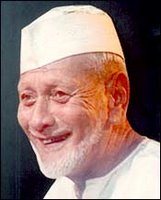 Ustad Bismillah Khan saheb is no more. With his passing away we have lost a doyen of Indian Classical music. Ustad Bismillah Khan was single handedly responsible for giving the shehnai the pride of place it enjoys today. He brouught the instrument out from the marriage halls to the rarified heights of the classical music stage. A typical Banarasi – his language, courtesy, simplicity and straight forwardness were legendary. A story goes - narrated by Khan saheb himself - that a certain rich American gentleman once requested him to migrate to the US. To that Khan saheb remarked, "When I am out of the country (India), I see its image wherever I go and when I am in any city in India (Mumbai, Chennai etc) I see images of Benaras. Can you Sir replicate Benaras for me here, with the Ganges, Shivalas and temples. If you can't then I shall have to go back". A deeply religious man who read his namaz 5 times a day, irrespective of where he was, was once asked by Pandit Jasraj what he
Ustad Bismillah Khan saheb is no more. With his passing away we have lost a doyen of Indian Classical music. Ustad Bismillah Khan was single handedly responsible for giving the shehnai the pride of place it enjoys today. He brouught the instrument out from the marriage halls to the rarified heights of the classical music stage. A typical Banarasi – his language, courtesy, simplicity and straight forwardness were legendary. A story goes - narrated by Khan saheb himself - that a certain rich American gentleman once requested him to migrate to the US. To that Khan saheb remarked, "When I am out of the country (India), I see its image wherever I go and when I am in any city in India (Mumbai, Chennai etc) I see images of Benaras. Can you Sir replicate Benaras for me here, with the Ganges, Shivalas and temples. If you can't then I shall have to go back". A deeply religious man who read his namaz 5 times a day, irrespective of where he was, was once asked by Pandit Jasraj what he thought about missing his namaz when he was in the midst of a long recital, replied "Woh hi to asli namaz hai jo Allah kubool karte hai" i.e, "my music is the only prayer that is really accepted by the Lord". There are so many anecdotes about the man that I can't resist putting them down. Once at a musical function Pandit Jasraj was slotted to perform after Ustadji, to which he felt very guilty (in a typical classical music function the juniors are followed by the seniors and a hierarchy is maintained). When Panditji complained to Khan Saheb that the organisers had really goofed up (by scheduling him after the mestro), Khan Saheb told him, and I translate, " Beta (son), the organisers are God's own people and they follow the Lord's dictat (firman) and it is His wish that you perform after me, so why are you feeling bad! Just be yourself and sing".
thought about missing his namaz when he was in the midst of a long recital, replied "Woh hi to asli namaz hai jo Allah kubool karte hai" i.e, "my music is the only prayer that is really accepted by the Lord". There are so many anecdotes about the man that I can't resist putting them down. Once at a musical function Pandit Jasraj was slotted to perform after Ustadji, to which he felt very guilty (in a typical classical music function the juniors are followed by the seniors and a hierarchy is maintained). When Panditji complained to Khan Saheb that the organisers had really goofed up (by scheduling him after the mestro), Khan Saheb told him, and I translate, " Beta (son), the organisers are God's own people and they follow the Lord's dictat (firman) and it is His wish that you perform after me, so why are you feeling bad! Just be yourself and sing".Khan saheb also, sadly, stands testimony to the apathy we Indians can show to our truly legendary masters. Save for the last minute dash of a Rs. 2.5 lakhs cheque that the PM sent across, the great master lived in penury. At times I wonder if we, as a nation, deserve to have such stalwarts among us. What have we been able to give to such men? Had he been born in US or Europe he would have been able to live a much more comfortable life but then, on second thoughts, there is ‘life’ in India.
Friday, July 21, 2006
Manu - the lawgiver
 Indian society. A film can either be viewed as a simple story well narrated or as a larger message hidden within the story. Two flicks that I recently saw had, surprisingly, juxtapositioned how Indian society viewed its women. ‘Antarmahal’ – a view of the Inner Chamber or, to me, an intimate view of the sanctum sanatorium of marriage. This period portrays the twin lives of the wives of a zamindar’s harem. Directed by Rituporno Ghosh, this perhaps is among the best Bengali movies that he has directed. The second film – ‘Water’ – directed by Deepa Mehta is also a period film depicting the life of widows in India.
Indian society. A film can either be viewed as a simple story well narrated or as a larger message hidden within the story. Two flicks that I recently saw had, surprisingly, juxtapositioned how Indian society viewed its women. ‘Antarmahal’ – a view of the Inner Chamber or, to me, an intimate view of the sanctum sanatorium of marriage. This period portrays the twin lives of the wives of a zamindar’s harem. Directed by Rituporno Ghosh, this perhaps is among the best Bengali movies that he has directed. The second film – ‘Water’ – directed by Deepa Mehta is also a period film depicting the life of widows in India.
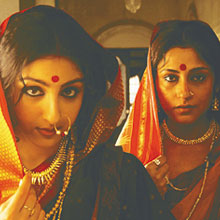 Both the directors wouldn’t have met over a cup of coffee and discussed their films but it is pure serendipity that I watched these 2 films back to back. Antarmahal shows how a Zamindar remarried again since he failed to beget a child with his first wife and the intertwined lives of his wives. The zamindar, as a typical all powerful male, refuses to believe that he is impotent and not his wives.
Both the directors wouldn’t have met over a cup of coffee and discussed their films but it is pure serendipity that I watched these 2 films back to back. Antarmahal shows how a Zamindar remarried again since he failed to beget a child with his first wife and the intertwined lives of his wives. The zamindar, as a typical all powerful male, refuses to believe that he is impotent and not his wives. The belief, that a male can’t be impotent, peaks to such levels of absurdity that he gets a Brahmin to chant Vedic verses while he makes love to his wife, not once or twice but everyday. It is so easy, in today’s context, to replace the zamindar with a typical Indian male. You would see the same thought process and the same haughtiness. The zamindar also had a concubine, needless to say childless again. When the zamindar’s second wife quizzes him on why does he have a different eau-de-cologne on then what he had in the morning, pat comes the reply “A man from a rich family is expected to have a different eau-de-cologne on when he returns home in the evening!”
The belief, that a male can’t be impotent, peaks to such levels of absurdity that he gets a Brahmin to chant Vedic verses while he makes love to his wife, not once or twice but everyday. It is so easy, in today’s context, to replace the zamindar with a typical Indian male. You would see the same thought process and the same haughtiness. The zamindar also had a concubine, needless to say childless again. When the zamindar’s second wife quizzes him on why does he have a different eau-de-cologne on then what he had in the morning, pat comes the reply “A man from a rich family is expected to have a different eau-de-cologne on when he returns home in the evening!”
‘Water’ exposes the soft underbelly of Indian society exposing its sycophancy in dealing with widows.  Indian widows, as a tradition, are supposed to shave their heads, don a plain cotton white saree, sustain on a strictly vegetarian diet and keep off fried food! Child marriages was rampant (in fact the norm!) right upto the early 19th century and you had child widows who had never met their husbands except the day that they got married. So what does the child bride remember about the marriage? The feast, the guests
Indian widows, as a tradition, are supposed to shave their heads, don a plain cotton white saree, sustain on a strictly vegetarian diet and keep off fried food! Child marriages was rampant (in fact the norm!) right upto the early 19th century and you had child widows who had never met their husbands except the day that they got married. So what does the child bride remember about the marriage? The feast, the guests crowding in, the bright and colorful dress, and all the pampering! One stoke of fate turns a bright, bubbly child into a widow, plucked from her home, her parents and siblings and literally dumped in one of the teeming ‘Ashrams’ meant for widows either in Benaras (Varanasi) or Vrindavan! So what happened in the ashram? The less told the better. The widows were peddled to satisfy the whims and fancies of the landed gentry and high profile Brahmins. And what does one of the Brahmins have to say on this, “A widow is blessed when she makes love to a Brahmin!”
crowding in, the bright and colorful dress, and all the pampering! One stoke of fate turns a bright, bubbly child into a widow, plucked from her home, her parents and siblings and literally dumped in one of the teeming ‘Ashrams’ meant for widows either in Benaras (Varanasi) or Vrindavan! So what happened in the ashram? The less told the better. The widows were peddled to satisfy the whims and fancies of the landed gentry and high profile Brahmins. And what does one of the Brahmins have to say on this, “A widow is blessed when she makes love to a Brahmin!”
So does contemporary India continue to have these practices? Yes and No. India lives in multiple worlds and periods. The rural areas still practice child marriages. City dwellers are more enlightened though the strictures for a widow is still followed, excepting the shaving of the head. Do the men follow the same rules when they are bereaved from their wives? NO.
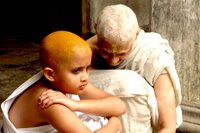 That also brings us to the title of this post. Manu, a revered sage of ancient India, was and is regarded as a lawgiver par excellence of both ancient and modern India. While he would have framed his laws in keeping with the times and social environment when he was alive, his laws were twisted and interpreted to suit males, Brahmins, the Kashtriyas…. in that order. Some gems from Manu to illustrate what I mean.
That also brings us to the title of this post. Manu, a revered sage of ancient India, was and is regarded as a lawgiver par excellence of both ancient and modern India. While he would have framed his laws in keeping with the times and social environment when he was alive, his laws were twisted and interpreted to suit males, Brahmins, the Kashtriyas…. in that order. Some gems from Manu to illustrate what I mean.
By a girl, by a young woman, or even by an aged one, nothing must be done independently, even in her own house. [v.5.147.]
In childhood a female must be subject to her father, in youth to her husband, when her lord is dead to her sons; a woman must never be independent. [v.5.148.]
Though destitute of virtue, or seeking pleasure (elsewhere), or devoid of good qualities, (yet) a husband must be constantly worshipped as a god by a faithful wife. [v.5.154.]
A man who is not a Brahmana ought to suffer death for adultery (samgrahana); for the wives of all the four castes even must always be carefully guarded. [v.8.359.]
Let him never slay a Brahmana, though he have committed all (possible) crimes; let him banish such an (offender), leaving all his property (to him) and (his body) unhurt. [v.8.380.]
Monday, June 26, 2006
No Uploads!

Tuesday, April 11, 2006
Missing PKG

It is only a noble, spotless, soul that passes into the other world with such effortless ease. He was hospitalized on a Saturday (8th Apr 06) and passed away on Sunday (9th Apr 06) in the morning. We miss you terribly Prabir da, and it is so difficult to come to terms with the loss.
Jishnu
The last time he did so was on Friday afternoon, a day before he was taken ill. I had to send an internal mail intimating all about a Wipro batch that was starting the next day. Every time I started writing the mail, I was called in some meeting or the other or someone would come to meet me or there would be a telephone call. This went on for more than two hours. Prabirda then walked up to my room and asked the usual “ki korcho”. I said, “Prabirda, I am unable to send this mail out for the last two hours. So please do not talk to me for the next ten minutes till I am done.” He said, “Ok, let me sit right in front of you and I won’t let anyone disturb you.” How I wish he would talk to me now!
He would start every morning immediately after stepping into the office by saying “Ki korcho? Ekto aashbe?” Then we would get into a discussion of the immediate concerns and then all things we as a company must do. If something personal was bothering him, he would talk about it. “Aar ki hobe” was his way of developing and pushing us to think through a problem and come out with answers.
He was a master operations man. Nothing would rattle him. We would get so worked up if there was an issue to serve a customer and would barge into his room to complain. PKG would listen calmly and work out a solution like magic. If he was particularly pleased with himself, he would say “experiencer ekta daam ache to, bujhle? Iyarki hocche?”
Lessons to be learnt from him is his ability to stay calm, handle pressure, think in a mature way and fierce loyalty to the company.
I could go on and on and on. The memories are too many, too fresh. He had changed his car about a month ago and was very pleased about the deal of getting two cars with hardly any extra payout. Before he decided on either of the cars, he would call me and say “Jishnu, ekto chaliye dekho to theek ache kina.”
He loved to entertain. There are so many times we have gathered at his house for a drink. A few Globsynites gathered at my house a few months ago. PKG sat with me to fix the menu, budget and all other arrangements. It was his party, just that the venue was not his house. He was the last to leave helping me to clean up the house. His wife, our beloved Boudi, kept on yawning but knowing her husband, she kept on waiting patiently till PKG had finished his supervision. He missed throwing these parties at his house and had discussed with me just over a week ago about making several small groups and inviting them over.
It is eerie to come to the office and not seeing him either at his desk or at the cafetaria. Every step I am taking for the last two days, I can see him, hear him, talk to him.
Farewell, Prabirda. Farewell an elder brother, a guide, a boss – who was more like a friend.
--------------------------
Sudipto
on 30th of March me and PKG went to Delhi for AICTE hearing. Whole of the day we were along. I can't forget the responsibility he has taken before the hearing committee. We have discussed a lot about our future plan of action on the matter by standing in the Indira Gandhi Stadium Compound. We also have planned to go to Delhi again in the middle of April. But..... I will not get him any more by my side. But he will always be with us in our every work. I will also miss him at the Board Room . The Board will surely miss the charming personality of PKG. We will all miss you sir.
------------------
Arijit
I got the sad news on Sunday morning. I was very shocked to hear that.
I am thankful that I got the opportunity to work very closely with him in my professional career. I shall never forget the support that I have received from PKG as the Quality Management Representative (QMR).
We all pray to God "May His soul rest in peace".
I believe that the Almighty will give all of us the courage to overcome the shock and take forward the dreams of PKG for "GLOBSYN".
PKGs' memories will be forever with us.
-------------
Friday, March 24, 2006
The 'Inner Voice' - again!
 The fabled 'Inner Voice' has sounded again! I am amazed at the sense of timing of the inner voice. Sonia's much belated resignation, both as a MP and chairperson of NAC, well after the parliament was adjourned sine die just to facilitate the ordinance that would have defined 'offices of profit' or rather struck out 'offices' that our honoured politicians hold from the offices of profit list!
The fabled 'Inner Voice' has sounded again! I am amazed at the sense of timing of the inner voice. Sonia's much belated resignation, both as a MP and chairperson of NAC, well after the parliament was adjourned sine die just to facilitate the ordinance that would have defined 'offices of profit' or rather struck out 'offices' that our honoured politicians hold from the offices of profit list!
Goes a long way to illustrate how meticulously planned the voicing of the ‘inner voice’ is and the martyring of our politicians. Wait and see the drooling Congressmen fall over each other to fawn and pray before Martyr Gandhi – the tallest ‘politician’ in the horizon – voiced by, none other than, the economist PM himself.
Read my other blog on the subject that I had written way back when Sonia’s ‘inner voice’ was heard for the first time while refusing to be the PM!
Thursday, March 02, 2006
A Hindi Flick after a long time....


